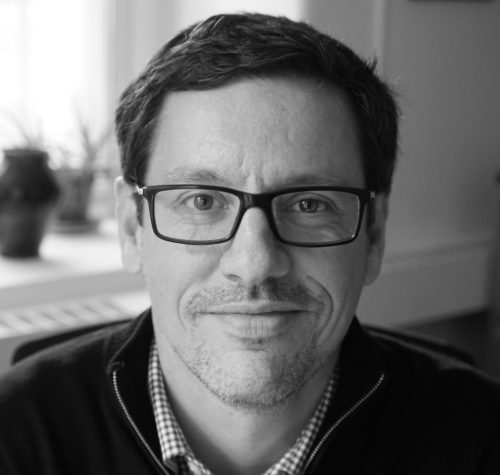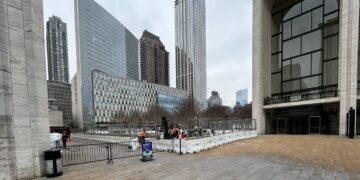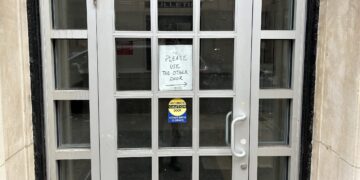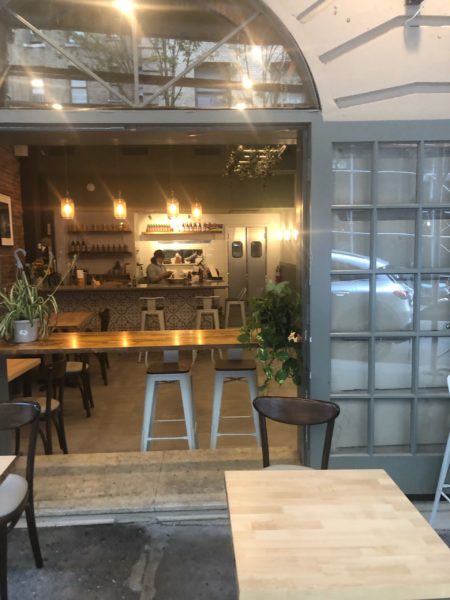
By Fernanda Martinez
It’s Climate Week in NYC, “a time to showcase leading climate action,” its organizers, the Climate Group, say. To that end, WSR reached out to Columbia University, which recently established its first new school in 25 years. The “Columbia Climate School,” a university partner of Climate Week, is a direct response to the pressing climate crisis. Professor Jason Smerdon, an Upper West Sider, helped design its educational programs. We spoke to him about the school’s significance; the way things are going climate-wise, including on the UWS; and how to get involved.
This interview has been edited for length and clarity.
WSR: Why a Climate School now?
Professor Smerdon: Climate change is here, and it’s going to impact everybody. We are trying to anticipate a school of the future that recognizes the role that climate plays in all fields and professions. We have no choice. Everybody needs to be thinking this way. Climate is fundamental to everything we do. We’re already seeing the impacts of the storms that come through. We will see them get stronger, creating massive rain events. Henri broke a decades-long record in Central Park for the most rain in 24 hours, and, a week later, Ida came through and broke that record. The East Coast is also one of the fastest rising sea level coasts, with over a foot of sea level rise since the beginning of the 20th century, impacting coastal infrastructure throughout the five boroughs.
WSR: How might the UWS feel it?
Prof. S: Extreme events affect different communities differently, but the Upper West Side doesn’t get off easy on this one, because we do not operate as our own little sealed-off community. We are part of a massive resource distribution system. As climate change moves forward, it will impact agriculture and migration. When there are droughts in California, we are going to pay more for avocados on the Upper West Side. Moreover, as the climate warms and the winters get less severe, mosquitoes and ticks increase their range and their life cycles. This results in increased incidences of Lyme disease and West Nile virus, so there are also public health concerns. Warming doesn’t just happen in the atmosphere; it also happens in the ocean, influencing our fishing industry. It has an impact on ski resorts and their challenges with snow over the winter. These may seem like minor disruptions, but they will become more common, and we’ll feel it in our pocketbooks.
WSR: Will the Climate School prioritize solutions over discussion and theory? Can we expect something like Elon Musk’s colonization of Mars to come out of this new endeavor?
Prof. S: [laughing] We are not going to colonize Mars, but the School is concerned with practice-based solutions. There is an institute called the International Research Institute for Climate and Society, which grew out of an academic effort to predict El Niño and La Niña events. It was initially established precisely to communicate these predictions to communities across the globe who were going to be impacted. Now, it has grown into a larger mission of translating climate information to users on the ground, whether they’re farmers or economists thinking about ways to help farmers deal with these events. This is one specific example of purpose-based initiatives that are already being done around climate, which we want to amplify and pursue even more through The Climate School.
WSR: What are you most excited about?
Prof. S: As teachers, we really draw from the excitement and passion of our students, and the idea of bringing in all these new people who are going to be learning about these topics is the most exciting thing, from my perspective. Another thing that we are all looking forward to is the chance to really expand our efforts in climate, galvanize these efforts across the university, and expand into new areas that we don’t have well represented at Columbia yet, like climate justice.
WSR: Why is climate justice important?
Prof. S: The impacts of climate change are not felt evenly. The people who will bear the largest brunt of climate change are the poorest among us. That is, the poorest communities in New York City, the poorest counties in the United States, and the poorest countries internationally, are most vulnerable to the impacts of climate change, despite the fact that many of those communities have contributed the smallest amount to the problem. Fundamentally, that is an ethical issue. It’s a justice issue. So, when we think about the solutions to climate change, that asymmetry has to be considered.
Secondly, the solutions that we pursue could be equitable. They could either address and improve historical inequalities, or further perpetuate them. They could be administered fairly, and not based on, for instance, property values, but on ethical measures, in terms of how we protect our communities. We saw this during Ida: if we have flooding in New York City, it’s often not wealthy communities, like the Upper West Side, that are most impacted, but communities that are vulnerable and lower on the socioeconomic level. We have to recognize those disparities and incorporate them in the way that we respond to the climate crisis.
WSR: How can we, as a community, support the Climate School and its initiatives?
Prof. Smerdon: Engage. All of our virtual events are public and open to the community. Attend our lectures and panels, and contribute to the discussion through the public events that we have. As COVID restrictions wane we will be having more in-person, public events. There are lots of ideas for hosting events that pursue the co-creation of knowledge between the university and our communities here on the Upper West Side and West Harlem, and how to think about these challenges locally in a way that is collaborative. The Upper West Side is an amazing pool of talented intellectuals, artists, and business people who themselves may have ideas about how to address this crisis. They should think about reaching out to people within The Climate School with ideas for how we might partner, further our research and our education.
Check out The Climate School’s event calendar here.
Prof. Jason Smerdon is the leader of the Smerdon Climate Lab at the Lamont-Doherty Observatory. He holds a PhD in Applied Physics from the University of Michigan.









Timely and urgently needed. Based on the responses of world leaders to the recent UN and IPCC reports, we are not going to get off fossil fuels in time to prevent worsening humanitarian disasters. Please maintain a focus on geoengineering to cool the planet and buy us time to lower our carbon footprint.
Please maintain a focus on geoengineering to cool the planet and buy us time to lower our carbon footprint. We are not getting off fossil fuels fast enough.
Yeh, yeh, yeh, says you.
Prof. S: “Extreme events affect different communities differently, but the Upper West Side doesn’t get off easy on this one, because we do not operate as our own little sealed-off community. We are part of a massive resource distribution system… These may seem like minor disruptions, but they will become more common, and we’ll feel it in our pocketbooks.”
Sounds like the Professor belongs more in the Business School.
As a Columbia alumnus, I am not surprised.